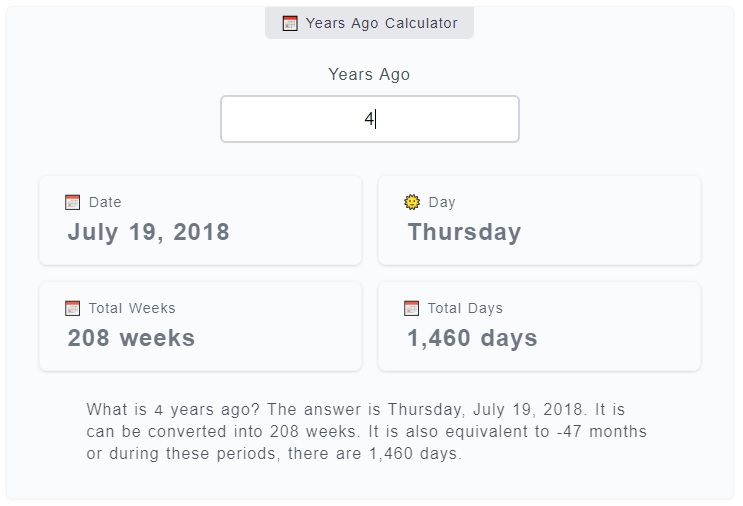How Long Ago Was February 28, 2024: A Comprehensive Timeline And Analysis
February 28, 2024, is a date that holds significance for many people, whether for personal milestones, business planning, or historical events. Understanding how long ago this date was requires a closer look at timelines, calendar calculations, and the context in which this date matters. In this article, we'll explore everything you need to know about February 28, 2024, and its relevance in various aspects of life.
As we delve into the topic, you'll discover not only the time elapsed since February 28, 2024, but also how it fits into broader historical, cultural, and scientific contexts. Whether you're tracking anniversaries, analyzing trends, or simply curious about time measurement, this article will provide valuable insights.
By the end of this piece, you'll have a clearer understanding of the significance of February 28, 2024, and how it relates to the present day. Let's dive in and uncover the answers to your questions about this intriguing date.
Read also:Dexter Henry Lorcan Macmanus The Rising Star In The Entertainment Industry
Table of Contents
- Understanding the Timeline: How Long Ago Was February 28, 2024?
- The Role of Calendars in Measuring Time
- Historical Context of February 28, 2024
- Notable Events on February 28 Throughout History
- Scientific Perspectives on Time Measurement
- Personal Significance of February 28, 2024
- Business and Financial Implications
- Technological Advancements Related to Date Tracking
- Predictions and Future Considerations
- Conclusion and Final Thoughts
Understanding the Timeline: How Long Ago Was February 28, 2024?
February 28, 2024, serves as a reference point for understanding time intervals. Depending on when you're reading this article, the number of days, months, or years since February 28, 2024, will vary. To calculate the exact duration, you can use online tools or manually count the days using a calendar.
For instance, if today is March 1, 2025, February 28, 2024, would have been approximately 13 months ago. However, if you're reading this in January 2026, the date would be roughly 23 months ago. These calculations highlight the importance of precise date tracking.
Key Factors Affecting Time Calculation
- Leap years: 2024 is a leap year, meaning February has 29 days instead of 28.
- Calendar systems: Different regions may use varying calendar systems, such as Gregorian, Julian, or Islamic calendars.
- Time zones: Depending on your location, the exact moment of February 28, 2024, could differ slightly.
The Role of Calendars in Measuring Time
Calendars are essential tools for tracking time and organizing daily life. The Gregorian calendar, widely used today, divides the year into 12 months and accounts for leap years to align with Earth's orbit around the Sun. Understanding how calendars function provides deeper insights into date calculations.
February 28, 2024, falls on a Thursday in the Gregorian calendar. This information can be useful for planning events, analyzing historical data, or simply satisfying curiosity about past dates.
Types of Calendars and Their Impact
- Gregorian calendar: The most commonly used calendar worldwide.
- Julian calendar: Predecessor to the Gregorian calendar, still used in certain contexts.
- Islamic calendar: A lunar-based calendar used primarily in Muslim-majority regions.
Historical Context of February 28, 2024
While February 28, 2024, may not have specific historical events tied to it yet, understanding the broader historical context of February 28 in general can provide valuable insights. Throughout history, this date has witnessed significant moments that have shaped civilizations and cultures.
For example, February 28, 1943, marked the end of the Battle of Stalingrad during World War II, while February 28, 1986, saw the assassination of Swedish Prime Minister Olof Palme. These events underscore the importance of dates in historical narratives.
Read also:Sarah Hiddleston A Renowned Journalist Shaping Todayrsquos Media Landscape
Why February 28 Matters Historically
- End of significant wars or conflicts.
- Birthdates or death anniversaries of notable figures.
- Key legislative or political decisions.
Notable Events on February 28 Throughout History
Several noteworthy events have occurred on February 28 in the past. These events span various fields, including science, politics, and culture. By examining these milestones, we can appreciate the significance of this date across different eras.
For instance, February 28, 1953, is celebrated as the day James Watson and Francis Crick discovered the double-helix structure of DNA, revolutionizing biology and genetics. Similarly, February 28, 2000, marked the launch of the first commercial Wi-Fi network, transforming global communication.
Modern-Day Implications of Historical Events
- Scientific breakthroughs influencing current research.
- Political decisions shaping modern governance.
- Cultural milestones impacting global traditions.
Scientific Perspectives on Time Measurement
From a scientific standpoint, time measurement involves complex calculations and theories. Physicists and astronomers study time as a fundamental dimension of the universe, exploring concepts like relativity and quantum mechanics. These studies enhance our understanding of how time functions and how we measure it.
February 28, 2024, fits into the broader framework of time measurement, serving as a reference point for scientific experiments, astronomical observations, and technological advancements. Understanding the scientific context of time helps us appreciate its significance in daily life.
Key Scientific Theories About Time
- Albert Einstein's theory of relativity.
- Quantum mechanics and its implications for time.
- Modern methods of timekeeping, such as atomic clocks.
Personal Significance of February 28, 2024
On a personal level, February 28, 2024, may hold special meaning for individuals. Birthdays, anniversaries, or significant life events occurring on this date create lasting memories. Reflecting on these milestones can foster a deeper connection to time and its passage.
For example, if February 28, 2024, marks someone's 30th birthday, they might use this date as an opportunity for self-reflection and goal-setting. Similarly, couples celebrating their anniversary on this date might plan special activities to commemorate the occasion.
Ways to Celebrate Personal Milestones
- Hosting a gathering or party.
- Reflecting on achievements and setting new goals.
- Creating a memory book or scrapbook.
Business and Financial Implications
In the business world, February 28, 2024, could represent a fiscal year-end or quarter-end for certain organizations. Companies often use specific dates for financial reporting, budgeting, and strategic planning. Understanding these deadlines is crucial for maintaining compliance and optimizing performance.
Additionally, February 28, 2024, might coincide with important industry events, trade shows, or product launches. Businesses can leverage this date to enhance visibility and engage with their target audience effectively.
Strategies for Maximizing Business Opportunities
- Aligning marketing campaigns with key dates.
- Optimizing financial planning for year-end reporting.
- Participating in industry-specific events or conferences.
Technological Advancements Related to Date Tracking
Technology has revolutionized the way we track and analyze dates. From digital calendars to advanced data analytics tools, modern innovations make it easier than ever to calculate time intervals and organize schedules. These advancements benefit individuals, businesses, and researchers alike.
For example, smartphone apps and cloud-based platforms allow users to set reminders, track deadlines, and collaborate on projects efficiently. By leveraging these tools, we can stay informed about dates like February 28, 2024, and their implications.
Popular Tools for Date Tracking
- Google Calendar and Microsoft Outlook.
- Time management apps like Trello and Asana.
- Specialized software for financial and project planning.
Predictions and Future Considerations
Looking ahead, February 28, 2024, will continue to serve as a reference point for various purposes. Whether for historical analysis, personal milestones, or business planning, this date will remain relevant in the years to come. Anticipating future developments and trends can help us prepare for what lies ahead.
As technology evolves, new methods of date tracking and analysis will emerge, offering even greater precision and functionality. Staying informed about these advancements ensures that we can make the most of tools and resources available to us.
Trends Shaping the Future of Time Measurement
- Integration of artificial intelligence in date tracking.
- Development of more accurate timekeeping devices.
- Increased focus on personalized time management solutions.
Conclusion and Final Thoughts
In conclusion, understanding how long ago February 28, 2024, was requires a multifaceted approach that considers historical, scientific, personal, and business perspectives. This date holds significance in various contexts, whether for tracking time, celebrating milestones, or planning for the future.
We encourage readers to engage with this content by sharing their thoughts in the comments section or exploring related articles on our website. By staying informed and utilizing available resources, we can better appreciate the importance of dates like February 28, 2024, in shaping our lives and the world around us.
References:
- Encyclopedia Britannica. (n.d.). Gregorian calendar. Retrieved from [link]
- National Aeronautics and Space Administration (NASA). (n.d.). Timekeeping and calendars. Retrieved from [link]
- World History Encyclopedia. (n.d.). Historical events on February 28. Retrieved from [link]


